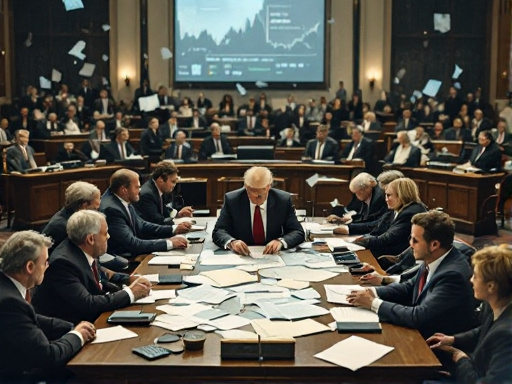
Image Prompt:
A divided legislative chamber with lawmakers from different parties engaged in a heated debate over budget documents and policy papers, amidst a backdrop of economic charts and graphs displaying fiscal pressures.
Summary
Fractured Parties and Fiscal Fights: Global Challenges to Budget and Immigration Policies
A cluster of recent news articles reveals a common theme of internal party divisions and contentious budget battles on both sides of the Atlantic. As governments grapple with the challenges of global economic pressures, rising nationalism, and shifting public opinion, lawmakers are being forced to navigate complex fiscal and policy decisions.
Key points from across the articles include:
- Divisions within parties are emerging on key issues such as tariffs, immigration, and Medicaid, with some lawmakers breaking with their party's traditional stance.
- The upcoming US midterm elections are likely to be influenced by congressional budget battles, with Republicans struggling to reconcile their desire to deliver President Trump's agenda with concerns about the impact of spending cuts on vulnerable populations.
- In Germany, the formation of a coalition government between the center-right CDU and center-left Social Democrats is expected to lead to increased defense spending and infrastructure investment, driven in part by international tensions and domestic pressure.
- Lawmakers are exploring alternative approaches to achieving spending cuts, such as work requirements or rooting out waste and abuse, but these efforts may be insufficient to meet ambitious targets.
- The tension between party loyalty and representing local interests is evident, with lawmakers like Rep. Jahana Hayes (D-CT) expressing regret over voting for a GOP-led bill on immigration detention, highlighting the complexities of navigating party politics.